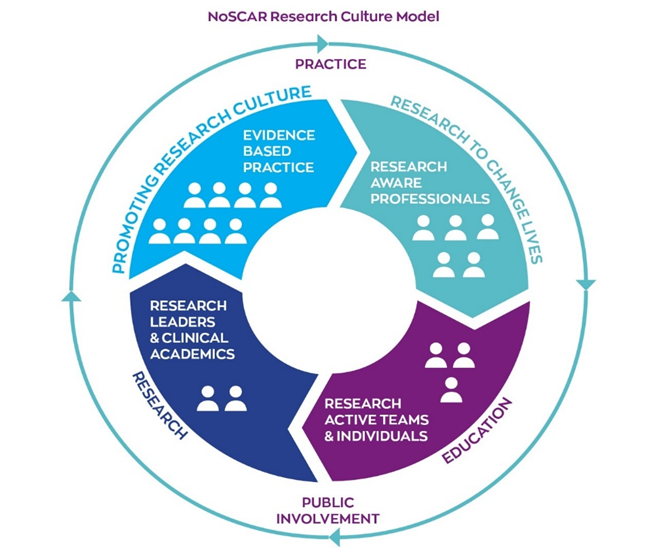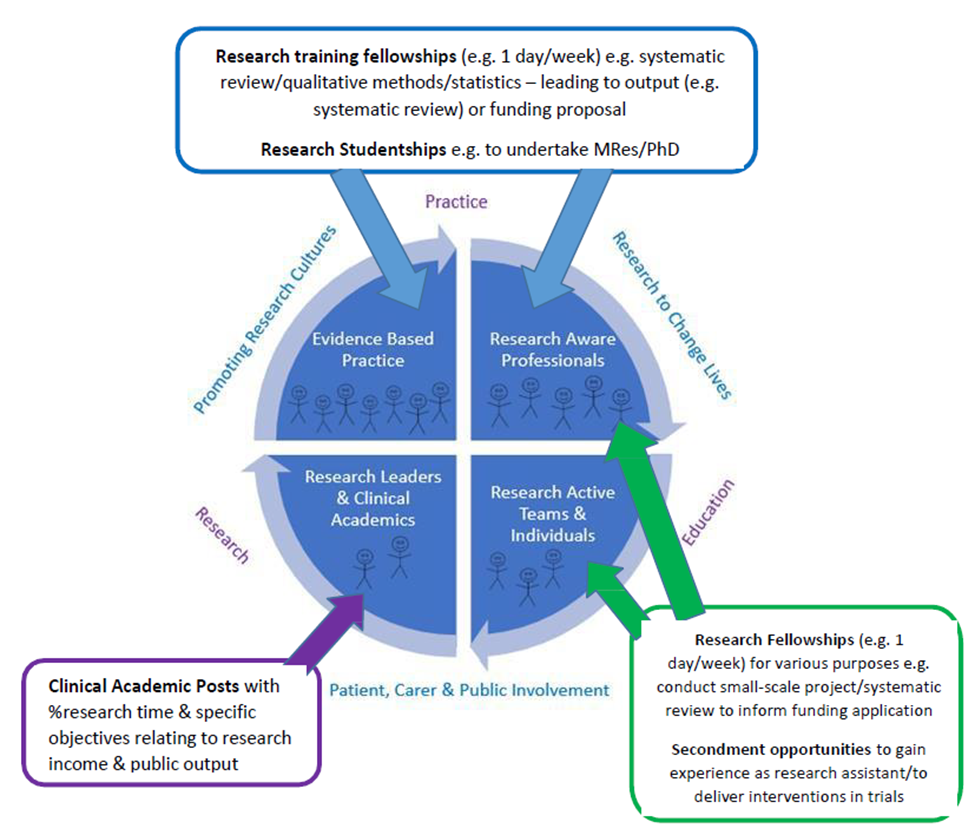NMAHP Research & NoSCAR
About Us
Are you a nurse, midwife or allied health practitioner willing to combine passion and career with excellent research? Then the North-East Scotland Network for Nursing, Midwifery & Allied Health Professions Research (NoSCAR) is the right multidisciplinary network for you.
NoSCAR, a professional network led by a group of Nursing, Midwifery and Allied Health Professionals (NMAHPs) from NHS Grampian and academics from Robert Gordon University, is transforming what it means to be an NMAHP in an era where scientific methods and technology keep evolving. Our research and evidence based practice network seeks to work with a range of stakeholders to make Grampian THE place to work as a NMAHP who is committed to improving health outcomes and experiences through research and development.
Our Mission
We aim to lobby for; develop and deliver research and evidence based practice capacity building opportunities that support NMAHPs to engage in impactful research and research implementation activities which saves lives and improve the wellbeing of the population.
What do you stand to benefit?
- A network that enables evidence-based practice
- Signposting centre for connecting professionals and academics
- An advisory hub for developing research skills and ideas
- Sources of funding for staff interested in research
- Mentorship, support, and collaboration with wider relevant research groups
Our research culture model
Research is for everyone – either designing and delivering it or using it. We aim to support each other across the NMAHP workforce to grow in our confidence and skills in using and developing evidence in partnership with the public, patients and families so that the care and treatments we provide are based on reliable and relevant evidence.

Not all NMAHPs will want to or become research active. The level of engagement is dependent on the role we occupy and personal professional interests. A positive research culture is one within which all professionals can engage with evidence to transform practice and career paths which enable you to do and/or lead research are clear. Our model below outlines the different career stages that we seek to support colleagues to navigate.
Our clinical academic research career framework

NHSG R&D strategy
NHS Grampian are fully committed to developing as a world class leader in research and you can find out more about the local research strategy and work which is ongoing to deliver that strategy here.
Our Membership
Our membership is growing all the time. Members can be active participants in developing the research culture or just dip in to events or learning opportunities. You can contact us to become a member of the network or be placed on our distribution list by sharing your details to gram.NoSCAR@nhs.scot.
Research Education and Training Opportunities
The R&D Training Team collaborates closely with NHS Grampian, the University of Aberdeen, and Robert Gordon University to provide a service tailored to the needs of researchers and associated staff. We work with education staff in Clinical Research Facilities across the UK to provide researchers with a consistent and standardised programme of educational opportunities.
Good Clinical Practice (GCP) and Good Research Practice (GRP)
We have courses available GCP and GRP relevant to the type of clinical research you conduct. GCP training is currently available on-site at Foresterhill which is face-to-face sessions.
If you're not sure which course is right for you, dates and information can be found on the GCP/GRP training page.
You can also email us at gram.randdtraining@nhs.scot.
Seminars and Workshops
The training team also organises seminars and workshops. These are held on-site or via Microsoft teams depending on speaker preference and availability. Detailed information can be found on Grampian Research Office – training pages.
Bespoke Sessions
Where appropriate, the training team can provide bespoke sessions to research teams. However, resources are limited, and each request will be considered on an individual basis.
The team provides all their training courses to NHS Grampian, University of Aberdeen, and Robert Gordon University staff and students at no charge. However, researchers from commercial companies or private individuals will be charged, and these fees will be available upon request.
To inquire about course availability, please send an email to gram.randdtraining@nhs.scot.
Mentorship
We have a range of experienced researchers in our network. They can offer mentorship for research projects; research career planning and evidence based practice projects. If you would like a mentor, then please email Gram.Noscar@nhs.scot and share a little about your research interests and/or ambitions or your area of practice that you want to improve and we will seek to match you with an appropriate mentor.
We are currently building a list of mentors within the NoSCAR membership. There are many other clinicians and academics research active in the region, all are always happy to support novice and developing researchers and clinicians seeking to use evidence in practice.
Annual Seminar Series
We run an annual seminar series covering a range of research topics. Keep an eye out in the daily brief between September and June for these sessions which are online, those on our distribution list will be emailed directly.
We are always welcoming new speakers and topics, if you are interested, please email gram.noscar@nhs.scot.
Clinical and Academic Homes
Based on previous work at NHS Lothian, we have a clinical and academic homes framework in NHS Grampian. The framework allows Nurses, Midwives and Allied Health Professionals (NMAHPs) to set aside time to work in a different setting.
Practitioners and academics will focus on 2-3 specific objectives that will allow them to develop skills, partnerships, and/or work programmes that will help them, their career, profession, and/or practice.
If you would be interested in developing a home then AHPs should contact k.cooper@rgu.ac.uk and nurses and midwives should contact Deborah.baldie@nhs.scot.
Fellowships
STAR research fellowships and Chief Nurse/ Midwife Fellowships
NMAHPs with little research experience can do a short fellowship which they can use to develop some research experience on a small project or to take some dedicated time to write a PhD proposal for national funding calls.
The Chief Scientist Office offer a wide range of fellowships.
Fellowship applications need to be well developed including the identification of an academic supervisory team. We can support you in achieving this in house, those interested in fellowships please contact:
- AHPs- k.cooper@rgu.ac.uk
- Nurses and midwives Deborah.baldie@nhs.scot
MRes/ PhD funding/Clinical doctorate training
We aim to support some jointly funded doctoral training opportunities each year. These are offered to internal NHSG staff only and are advertised through professional networks and the Daily Brief.
Not sure if you should do a PhD or a clinical/ professional doctorate? Email gram.NoSCAR@nhs.scot and in the subject line ask for current types of doctorates, and we will email you an up-to-date document.
Other sources of support and training
- Council for Allied Health Professionals Research (CAHPR)
- JBI Centre of Excellence - RGU
- Educational Resources | Edinburgh Clinical Research Facility
- FutureNHS Research Masterclass for Nurses,Midwives and Health and Care Professions
Doing research
Designing research - Patient and Public Involvement (PPI)
All research should be informed by patients and the public so we can be sure that we are asking questions of importance and using methods which are acceptable and rigorous to answer our questions.
National Institute for Health and Care Research (NIHR) provide a great resource pack for undertaking PPI. Please also see the University of Aberdeen, information on PPI. Click the following links for further information about patient involvement and getting started in research.
Getting research grant funding
Locally NHSG charities supports small grants. These are useful as they enable early scoping, pilot or feasibility work to be completed before seeking larger grants.
There are a wide range of grants available to do research. We have mapped some of the most used, please email gram.NoSCAR@nhs.scot, and in the subject line request mapping of funding spreadsheet.
Getting evidence into practice
There are a range of skills development and support opportunities in quality improvement, please see the Quality Improvement and Assurance Team (QIAT) intranet pages for information. Members of NoSCAR can also act as mentors to support NMAHPs to undertake evidence-based practice projects.
Other resources
To know more about NoSCAR, please contact the following:
- NHSG Nurses and Midwives: Dr Deborah Baldie Deborah.baldie@nhs.scot
- NHSG and RGU AHP’s: Professor Kay Cooper k.cooper@rgu.ac.uk
- generic admin account Gram.NoSCAR@nhs.scot
- You can also read more about our Clinical and Academic Homes Framework here
